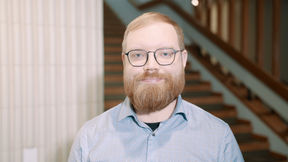Sakari Poikkimäki is replacing harmful chemicals with enzymes: ‘We can use small biological organisms in many everyday products’

How did you end up studying chemical engineering?
‘Even as a child, I was interested in nature, like different kinds of exotic animals. But biology didn’t initially interest me at all in upper secondary school. Then our teacher introduced me to microbiology, genetics and biochemistry. It was cool to understand how living things really work. Talking with my teacher had a really big impact on me finding my path – I’m really grateful of that!
At the end of upper secondary school, I decided to study something related to biology. After starting biotechnology studies at Aalto University, I realised that here I get to apply biology in practice, which seemed like the thing for me.’
What was studying like?
‘Student life at Aalto University completely swept me away. For example, I was actively involved in guild and association activities, making sure that everyone has a nice time as students. Of course, I learned a lot about science, but I think that the greatest growth I had was personal.’
What kind of work have you done in your career?
‘After graduation, I spent some time finding my way in the labour market: I worked in Barcelona for a couple of years in sales and then at another company as a process engineer. Now, I am working at Roal Oy as an expert in fermentation, which is exactly what I always wanted to do.
At Roal, we produce enzymes for different branches of industry. Enzymes are biomolecules that accelerate chemical reactions. An enzyme is like a very small biological machine that can do things like cut, glue and modify molecules. We produce them with moulds and bacteria, and they are used for purposes like food and baking products and in the feed, paper, pulp and textile industries. For example in laundry detergents, lipase enzymes break down fats, making it easier to remove dirt from textiles with water.’
Why is your work important?
‘What’s cool about my work is being able to harness small biological organisms and put them to practical use. The enzymes are produced from natural renewable raw materials and they are also biodegradable. In fact, they can replace harmful chemicals in industry and reduce the need for raw materials and energy, for example.’
What kind of skills did you gain by studying chemical engineering?
‘My studies gave me a solid foundation in the fields of chemistry, biology and technology, which allows me to solve challenges that come up in my work. However, I think that the most valuable skill I learned at university was how to effectively search for, understand and apply information. It allows me to develop as a person and a professional every day.’
What would you like to say to young people considering their choices of study?
‘Chemical engineering is an amazingly diverse field. My friends from university work all over Finland and the world, often in companies that are making the world a better place in some way. The chemical industry is a huge branch, so its development has a really significant impact on the environment.
There are also a lot of interesting start-ups in the field of chemical engineering. For example, start-ups in the Finnish food sector are developing alternative and more sustainable ways of producing proteins for global needs. That’s one example of the new solutions that you can get to develop in this field.’
_
After this interview in Spring 2023 Sakari Poikkimäki started as a Product Specialist at Solar Foods.
Solar Foods was born from a scientific research programme at VTT Technical Research Centre of Finland and Lappeenranta University of Technology. The research team discovered a way to turn emission-free electricity and captured CO2 into edible calories. In other words, growing food out of thin air.
Chemical engineering solves the biggest problems of our time
School of Chemical Engineering combines natural sciences and engineering to refine research results and put them into practice as sustainable innovations.

Read more news

Significant donation to boost pavement engineering research and education
Companies and associations in the field have donated €400,000 to the School of Engineering.
Design strengthens industrial competitiveness – human-centered factory work at the core
Factory work is undergoing a transformation: new technologies and artificial intelligence are changing the content and roles of work. Aalto University’s Department of Design is studying this change from a human-centered perspective in the HiFive project.
Learning to slow down: cold-water swimming benefits explored in new study
Swimming in cold water offers a temporal slowdown, promoting stress management and mental clarity that lingers long after the experience, says research from Finland.






